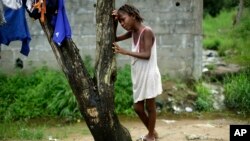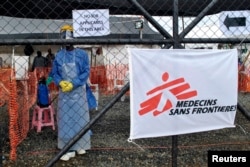Communities in Liberia have been searching for ways to commemorate the 4,808 people who died there during the regional Ebola epidemic.
For surviving family members such as Oretha Morris, the deadly virus took not only a life but the ability to have any kind of conventional closure.
“We never had the time to bury him, to give him proper burial [after] they took him away," she says of her father as tears stream down her face.
In silent prayer, she situates the base of a small palm tree in soil outside her home, just one of many remembrance trees now taking root across Monrovia.
"I will always remember him," she says. "I will always think about him — how loving, how caring my father was.”
The city-wide plantings are the result of a local radio campaign encouraging residents to plant kola nut trees and palms to commemorate the deceased.
Because remains of Ebola victims are especially contagious, epidemic containment efforts required immediate cremation or burial of any bodies — including those who died of unknown causes. Carried out by specially trained personnel with no connection to the families, the corpses were sometimes placed in unmarked graves.
For people like Marcus Speare, who headed Ebola burial teams in nearby Margibi County, the unceremonious interments were a grim necessity undertaken amid one of Liberia's darkest hours.
Now he hopes the trees can fill a void.
“It fills in the vacuum," he says. "It helps you that as that tree grows, your departed loved ones or friends or relative grow into a new life."
According to Aaron Weah, acting country director for Search for Common Ground, a U.S.-headquartered conflict prevention NGO that is working with Liberians recovering from Ebola, each community is finding its own way to honor the dead.
“Grand Cape Mount, where the [Muslims] practice — [Islam] is pretty much dominant in that part of the county — chose to do a feast and to read special Koran and scripture ... as a way of remembering those who died," he says. "In another community, they built a monument; in Lofa County, they are putting together a symbolic grave."
Liberia discharged its last Ebola patient on July 20. The World Health Organization declared the country Ebola-free on September 3.





